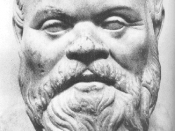In William L. Rowe's paper "The Problem of Evil and Some Varieties of Atheism" he sets out to accomplish two main goals. The first goal is directed toward theists, while the second attempts to reach the very wellspring of an atheist's heart. Foremost, Rowe sets out to show that there is "an argument for atheism based on the existence of evil that may rationally justify someone in being an atheist" (335). After he has effectively addressed this first issue he moves on to try and convince the atheist that in light of all the evidence that theists are rationally justified (just as much as the atheist) and therefore that atheists should subscribe to what Rowe calls "friendly atheism."
Rowe begins his paper by distinguishing two types of theists as well as two types of atheists. He makes a distinction between broad and narrow forms of each particular position. For Rowe a broad theist is someone who believes in a divine being while a narrow theist is someone who believes in an omniscient, omnipotent, eternal, supremely good, being who created of the world (335).
The distinctions for an atheist are similar. A broad atheist is someone who denies the existence of a divine being while a narrow atheist is someone who denies the existence of an omniscient, omnipotent, eternal, supremely good, being who created of the world. In Rowe's paper these distinctions are important because he only addresses the narrow versions of each.
In developing his argument for atheism Rowe begins by pointing out that our world contains a considerable abundance of intense human and animal suffering. While Rowe doesn't offer any defense for the assertion that suffering is innately evil he does point out that even though suffering may lead to or cause some good that would have otherwise...


